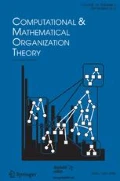Abstract
In this paper we analyze the evolution of solidarity relations between dissimilar actors by means of a cellular automaton framework. We assume that actors face two types of decisions in the course of an iterated game. First, actors&2018; solidarity decisions constitute mutual support relations between neighbors. Second, by migrating in a two dimensional world, actors select between potential solidarity partners. Moreover, actors are dissimilar with respect to their neediness class, i.e., their need for help. Hegselmann (1996) demonstrated by computer simulation that under these assumptions the behavior of (boundedly) rational egoists may lead to the emergence of a solidarity network that is characterized by class segregation. In the present paper, we explore whether the macro phenomenon of segregation depends on the micro assumption of rationality. We replace Hegselmann&2018;s rational egoist by an adaptive egoist, who takes solidarity and migration decisions on basis of the &2018;law of effect&2019;. A stochastic learning model (e.g., Flache and Macy, 1996) is used to simulate adaptive decision making. Our model of learning behavior, we show, entails the emergence of class segregated solidarity networks. At the same time, however, the evolving networks are considerably more fragile and less extended than those arising amongst rational egoists. While critics of the rational choice approach often argue that rational egoist models tend to underestimate the level of social solidarity, we showed that in this particular analysis relaxing the assumption of rationality may entail the prediction of less rather than more solidarity.
Similar content being viewed by others
References
Bush, R.R. and F. Mosteller (1955), Stochastic Models for Learning. Wiley: New York.
Dawes, R.M. and R.H. Thaler (1988), "Anomalies: Cooperation," Journal of Economic Perspectives, 2, 187–197.
Duncan, O.D. and B. Duncan (1955), "A Methodological Analysis of Segregation Indices," American Sociological Review, 2, 210–217.
Flache, A. (1996), The Double Edge of Networks: An Analysis of the Effect of Informal Networks on Cooperation in Social Dilemmas. Amsterdam: Thesis Publishers.
Flache, A. and M.W. Macy (1996), "The Weakness of Strong Ties: Collective Action Failure in a Highly Cohesive Group," Journal of Mathematical Sociology, 21, 3–28.
Friedman, M. (1953), Essays in Positive Economics. Chicago: University of Chicago Press.
Friedman, J.W. (1986), Game Theory with Applications to Economics (2nd edition 1991). Oxford: Oxford University Press.
Hechter, M. (1992), "The Insufficiency of Game Theory for the Solution of Real-World Collective Action Problems," Rationality and Society, 4, 33–40.
Hegselmann, R. (1994), "Zur Selbstorganisation von Solidarnetzwerken unter Ungleichen—Ein Simulationsmodell," in K. Homann (Eds.) Wirtschaftsethische Perspektiven I—Theorie, Ordnungsfragen, Internationale Institutionen, Berlin: Duncker & Humblot, pp. 105–129.
Hegselmann, R. (1996), "Cellular Automata in the Social Sciences—;Perspectives, Restrictions, and Artefacts," in R. Hegselmann, K.G. Troitzsch and U. Mueller (Eds.) Modeling and Simulation in the Social Sciences from the Philosophy of Science Point of View (Theory and Decision Library), Dordrecht: Kluwer, pp. 209–234.
Hegselmann, R. (1996a), "Social Dilemmas in Lineland and Flatland," in W.B.G. Liebrand and D. Messick (Eds.) Frontiers in Social Dilemma Research, Berlin: Springer, pp. 337–362.
Hegselmann, R. and A. Flache (1998), "Understanding Complex Social Dynamics: A Plea for Cellular Automta Based Modelling," Journal of Artificial Societies and Social Simulation, 1: http://www.soc.surrey.ac.uk/JASSS/1/3/1.html
Laumann, E.O. (1973), Bonds of Pluralism. New York.
Macy, M.W. (1990), "Learning Theory and the Logic of Critical Mass," American Sociological Review, 55, 809–826.
Macy, M.W. (1991), "Learning to Cooperate: Stochastic and Tacit Collusion in Social Exchange," American Journal of Sociology, 97, 808–843.
Macy, M.W. (1993), "Backward Looking Social Control," American Sociological Review, 58, 819–836.
Macy, M.W. and A. Flache (1995), "Beyond Rationality in Models of Choice," Annual Review of Sociology, 21, 73–91.
Roth, A. (1992), "Game Theory as Part of Empirical Economics," in J.D. Hey (Ed.) The Future of Economics, Cambridge: Blackwell, pp. 107–114.
Schelling, T. (1971), "Dynamic Models of Segregation," Journal of Mathematical Sociology, 1, 143–186.
Taylor, M. (1987), The Possibility of Cooperation (revised edition of: Anarchy and cooperation, 1976). London: Wiley & Sons.
Author information
Authors and Affiliations
Rights and permissions
About this article
Cite this article
Flache, A., Hegselmann, R. Rationality vs. Learning in the Evolution of Solidarity Networks: A Theoretical Comparison. Computational & Mathematical Organization Theory 5, 97–127 (1999). https://doi.org/10.1023/A:1009662602975
Issue Date:
DOI: https://doi.org/10.1023/A:1009662602975




